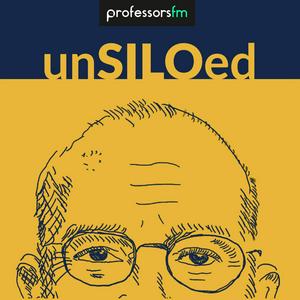535. How Evolutionary Psychology Can Inform Marketing, the Social Sciences, and the Denial of Science with Dr. Gad Saad
According to today’s guest, “ You can't study anything involving any creature, let alone human beings, let alone human beings in a business setting, whilst pretending that the biological forces that shape our behavior are somehow non-existent.” Dr. Gad Saad is a professor of marketing at Concordia University and the author of the books, The Consuming Instinct: What Juicy Burgers, Ferraris, Pornography, and Gift Giving Reveal About Human Nature and Parasitic Mind: How Infectious Ideas Are Killing Common Sense. His work applies evolutionary psychology to the fields of marketing and consumerism. Gad and Greg discuss resistance toward evolutionary psychology in academia, practical applications of the field in marketing and business, and finally, the implications of parasitic ideas on society and the balance between empathy and scientific truth.*unSILOed Podcast is produced by University FM.*Episode Quotes:The animus against evolutionary psychology[06:10] Maybe I could mention just a few reasons why people have such animus towards evolutionary psychology. So, number one, there's something called the human reticence effect, which exactly purports that evolutionary psychology and evolutionary biology should be applicable to every species, but human beings transcend those forces, right? Or it might explain why we have opposable thumbs, but surely don't use evolution to explain everything that's above the neck. Okay? In some cases, people could be a bit more flexible in saying, well, it explains very primal urges why I want to eat a juicy burger, but it surely can't explain higher-order reasoning. What do you mean? Where do you think our cognition comes from? And so, even though I'm completely used to, at this point, facing all the animus, it still surprises me because, to me, it should be banal and trivially obvious that, of course, evolutionary psychology explains our human behavior.According to Dr. Saad, a good marketer is wedded to a solid understanding of human nature. [15:16] A marketer who decides based on their understanding of the human mind, they will create product lines. If it’s not weathered to evolutionary psychology, it’ll fail. On why people hate evolutionary theory[20:52] There's a deeper reason why people hate evolutionary theory. I think it's because in many cases it attacks people's most foundational ideological commitment. Parasitic ideas that emanate from academiaI will be focusing on specific set of parasitic ideas that emanate from academia. And as it so happens, since academia is astonishingly leftist, those parasitic ideas happen to be originating, their genesis from the left. That doesn't mean that people on the right can't be parasitized. Show Links:Recommended Resources:Richard LewontinStephen Jay GouldHomicide: Foundations of Human Behavior by Martin Daly and Margo WilsonMultitrait-multimethod matrixThat’s Interesting! by Murray S. DavisRobert TriversPopperian falsificationAsch conformity experimentsThe Enigma of Reason by Hugo Mercier and Dan SperberHugo Mercier on unSILOedGuest Profile:Professional WebsiteProfile on LinkedInProfile on XThe Saad Truth podcastHis Work:The Consuming Instinct: What Juicy Burgers, Ferraris, Pornography, and Gift Giving Reveal About Human Nature Parasitic Mind: How Infectious Ideas Are Killing Common SenseThe Saad Truth about Happiness: 8 Secrets for Leading the Good Life
